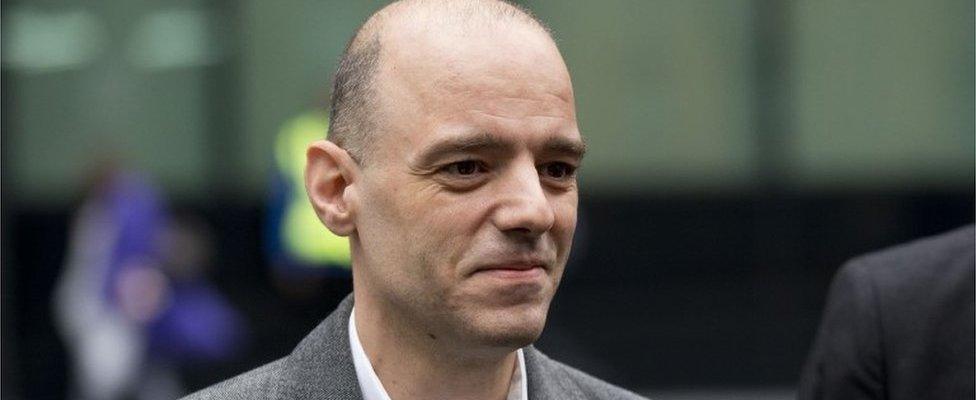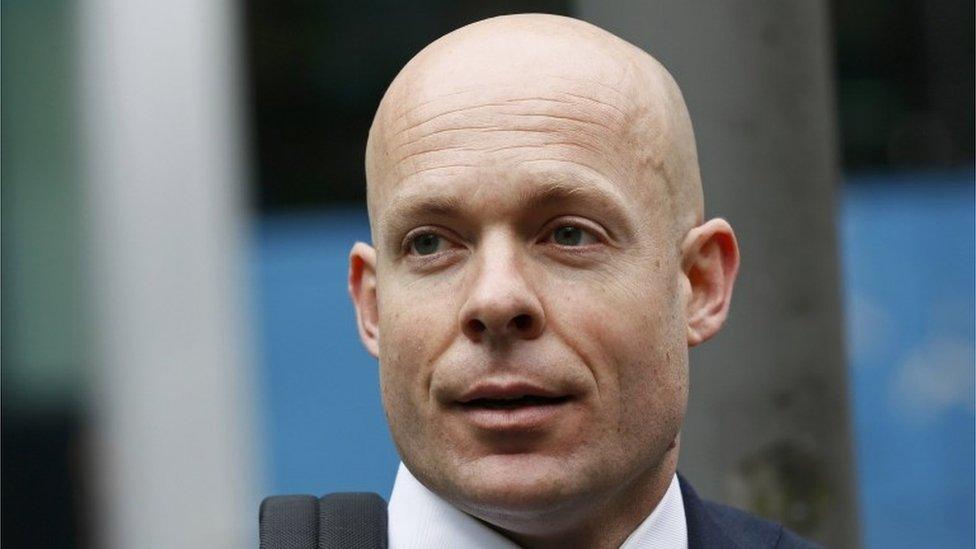Libor expert witness texted for help
- Published
The BBC's Andrew Verity explains the Libor scandal
A prosecution witness called by the Serious Fraud Office (SFO) as an expert on trading has admitted texting friends in the middle of his trial evidence to ask basic questions.
Saul Haydon Rowe texted a friend for help in explaining email evidence he had been asked to interpret.
He is an expert witness in a trial of ex-bankers accused of rigging Libor.
Asked about the texts, Mr Rowe agreed: "They are basic questions, so I could make sure I got the basics correct."
He was testifying on Wednesday as an expert on trading in the trial of two former Barclays traders, Stelios Contogoulas and Ryan Reich.
The court heard Mr Rowe had failed to disclose the text messages in previous Libor trials, in which he had given evidence.
'Not my area'
The defendants stand accused of conspiracy to defraud between 2005 and 2007 by trying to move the key interest rate benchmark, the London Interbank Offered Rate (Libor), in order to advantage their banks' trading positions.
Libor has been used to determine the cost of thousands of commercial mortgages and, notably in the United States, residential mortgages.
Until recently, it was arrived at by averaging submissions made daily by 16 contributor banks. At each bank, a Libor submitter would state what interest rate they thought the bank would have to pay to borrow cash from other banks.

Former Barclays trader Stelios Contogoulas is accused of conspiracy to defraud by rigging Libor
An element of the defence case, is that in making requests of the submitters for a higher or lower Libor, within a range of interest rates at which their bank might have borrowed, they were carrying out normal commercial practice, known of and allowed by bosses and regulators.
The court heard Mr Rowe had given sworn evidence as an expert on Libor and credit derivatives in earlier trials including the 2015 trial of former UBS trader Tom Hayes.
His text messages included one sent in June 2015, during the trial of Tom Hayes, where he said: "Got caught out on a couple of points, eg where yen Libor futures contracts trade. Not my area, and I didn't get one sound bite in that I wanted to get."
'Beyond me'
In another trial last April, after being directed by a judge not to talk about the case while his evidence was in progress, Mr Rowe texted a trader friend saying: "I don't know the usual trades stir [short-term interest rates] people put on but I'm learning."
The trader replied: "Trouble is, out of context it's actually quite hard to interpret. You get used to the methodology of the people around."
Mr Rowe replied: "Yes I agree. That's what I see on all my cases but it doesn't help when I have to explain a few emails and look knowledgeable."
In another text he asked the meaning of 'delta', which measures the amount of money at risk if a benchmark such as libor moves up or down.
"Delta…what is it measuring exactly?" he texted.
The next day he emailed a colleague saying: "We'll get a stir specialist on any future work as this mission has crept well beyond me."
Mr Rowe repeatedly said he had had conversations with the Serious Fraud Office about whether they still wanted him as a witness, given that he had not been a trader of investments based on short-term interest rates. But he said the SFO asked him to stay on.

Former trader Ryan Reich is also accused of rigging the Libor rate
The court heard that, under the Criminal Procedure Rules 2015, expert witnesses are obliged to disclose all the sources of information they have consulted and to draw the court's attention to questions outside their area of expertise.
Asked if he had read those rules, Mr Rowe said he did not know. But he acknowledged signing a truth statement saying that he had read the rules.
In the truth statement, Mr Rowe also said that a report he had given as an expert witness was his own work.
However, much of the report, used in all four UK trials of traders for manipulating Libor, titled "Libor and Interest Rate Markets, Products, Concept and Terminology", was in fact written by a colleague, the court heard.
Mr Rowe said that he considered if he had reviewed the work and could defend it in cross examination, he thought it was fair to say it was his work.
Adrian Darbishire QC, who is representing one of the defendants, said: "I suggest that you have misrepresented your expertise to the SFO and to the juries in front of which you have testified; I suggest you have failed to comply with your basic duties of disclosure; and that you have concealed, rather than revealed, the sources of statements which you have presented as your own opinion. Do you understand the suggestion?"
"There are many suggestions," Mr Rowe replied, "And I think I disagree with them all."
The case continues.